- Home
- Gareth L. Powell
Fleet of Knives
Fleet of Knives Read online
CONTENTS
Cover
Praise for Embers of War
Also by Gareth L. Powell and available from Titan Books
Title Page
Copyright
Dedication
Prologue
Part One
Chapter One
Chapter Two
Chapter Three
Chapter Four
Chapter Five
Chapter Six
Chapter Seven
Chapter Eight
Chapter Nine
Chapter Ten
Chapter Eleven
Chapter Twelve
Chapter Thirteen
Chapter Fourteen
Chapter Fifteen
Chapter Sixteen
Chapter Seventeen
Chapter Eighteen
Chapter Nineteen
Chapter Twenty
Chapter Twenty-One
Chapter Twenty-Two
Chapter Twenty-Three
Chapter Twenty-Four
Chapter Twenty-Five
Chapter Twenty-Six
Chapter Twenty-Seven
Chapter Twenty-Eight
Chapter Twenty-Nine
Chapter Thirty
Chapter Thirty-One
Chapter Thirty-Two
Chapter Thirty-Three
Chapter Thirty-Four
Chapter Thirty-Five
Chapter Thirty-Six
Chapter Thirty-Seven
Chapter Thirty-Eight
Chapter Thirty-Nine
Chapter Forty
Part Two
Chapter Forty-One
Chapter Forty-Two
Chapter Forty-Three
Chapter Forty-Four
Chapter Forty-Five
Chapter Forty-Six
Chapter Forty-Seven
Chapter Forty-Eight
Chapter Forty-Nine
Chapter Fifty
Chapter Fifty-One
Chapter Fifty-Two
Chapter Fifty-Three
Chapter Fifty-Four
Chapter Fifty-Five
Chapter Fifty-Six
Chapter Fifty-Seven
Chapter Fifty-Eight
Chapter Fifty-Nine
Chapter Sixty
Chapter Sixty-One
Chapter Sixty-Two
Chapter Sixty-Three
Chapter Sixty-Four
Chapter Sixty-Five
Chapter Sixty-Six
Chapter Sixty-Seven
Chapter Sixty-Eight
Chapter Sixty-Nine
Chapter Seventy
Chapter Seventy-One
Chapter Seventy-Two
Chapter Seventy-Three
Chapter Seventy-Four
Chapter Seventy-Five
Chapter Seventy-Six
Chapter Seventy-Seven
Chapter Seventy-Eight
Chapter Seventy-Nine
Chapter Eighty
Chapter Eighty-One
Chapter Eighty-Two
Chapter Eighty-Three
Acknowledgements
About the Author
Also Available from Titan Books
PRAISE FOR EMBERS OF WAR
“Ferociously good, proper galaxy smashing space opera.”
AL ROBERTSON
“A compulsively readable, expansive space opera.”
THE GUARDIAN
“Deep and juicy in the details… a morality play within a space opera, with literary-style character exploration in thriller-style structure and pacing.”
NEW YORK JOURNAL OF BOOKS
“A big book that hits all of the buttons that make space opera one of my favourite genres.”
TOR.COM BEST BOOKS OF 2018 SO FAR
“This is a true space opera, full of suspense, and mystery, and stuff blowing up real good—but it’s the humanity of Powell’s vision that truly makes it something special.”
BARNES AND NOBLE BEST SCIENCE FICTION AND FANTASY BOOKS OF 2018 SO FAR
“An excellently paced adventure that swells with energy and force, upping the stakes at every turn of the page.”
BOOK PAGE
“Vivid and sharp, and at times grittily poetic.”
LOCUS MAGAZINE
“Thoughtful, creative and lively… this is top-class space fiction.”
MORNING STAR
“A great sci-fi series, one likely to delight fans of Peter F. Hamilton and Iain M. Banks. Great stuff.”
STARBURST MAGAZINE
“An explosive finale with strong series potential.”
PUBLISHERS WEEKLY
“Gareth L. Powell’s work has lost none of its engaging action, but has gained depth and nuance.”
HUGO AWARD BOOK CLUB
“It’s hugely entertaining, and hints at a wider universe with the tantalising prospect of filling a Banksian hole in modern sci-fi.”
BRITISH FANTASY SOCIETY
“Read it, because before long blurbs will be comparing new and upcoming works with Gareth L. Powell.”
SFFWorld
“A first-rate author of space opera and alternate history.”
SFREVUE
FLEET OF KNIVES
Also by Gareth L. Powell and available from Titan Books
Embers of War
Light of Impossible Stars (February 2020)
GARETH L.
POWELL
FLEET OF KNIVES
AN EMBERS OF WAR NOVEL
TITAN BOOKS
Fleet of Knives: An Embers of War Novel
Print edition ISBN: 9781785655210
E-book edition ISBN: 9781785655227
Published by Titan Books
A division of Titan Publishing Group Ltd
144 Southwark Street, London SE1 0UP
First edition: February 2019
10 9 8 7 6 5 4 3 2 1
Names, places and incidents are either products of the author’s imagination or used fictitiously. Any resemblance to actual persons, living or dead (except for satirical purposes), is entirely coincidental.
Gareth L. Powell asserts the moral right to be identified as the author of this work.
Copyright © 2019 Gareth L. Powell
No part of this publication may be reproduced, stored in a retrieval system, or transmitted, in any form or by any means without the prior written permission of the publisher, nor be otherwise circulated in any form of binding or cover other than that in which it is published and without a similar condition being imposed on the subsequent purchaser.
A CIP catalogue record for this title is available from the British Library.
Did you enjoy this book?
Please email us at: [email protected]
To receive advance information, news, competitions, and exclusive offers online, please sign up for the Titan newsletter on our website:
TITAN BOOKS.COM
To Edith and Winter
“There would be no dance, and there is only the dance.”
T.S. ELIOT
PROLOGUE
SAL KONSTANZ
“I’m almost at the top.”
I’d been climbing since first light. The high desert wind’s thin fingers kept snatching at my cape. I had a scarf wrapped across my mouth and nose to keep out the swirling sand and ash, and wore dark goggles to protect my eyes from the glare.
“I know.” The Trouble Dog’s voice came via an implant in my right ear. “I’m monitoring your position, and your vital signs.” She sounded impatient, but I didn’t have the breath to respond. The Temples of the High Country stood on an imposing mesa, high above an arid wasteland, and the only way to reach them was via steps carved into the side of the mesa’s rust-coloured cliffs.
“I still think it would have been quicker fo
r me to drop you at the top,” she said.
“You know that’s forbidden.” The steps had been smoothed to a shine by the millennial action of wind and sand, and the tread of countless feet—both human and otherwise. My lungs and thighs burned from the ascent. I spoke between laboured breaths. “And besides, it’s kind of missing the point. Climbing the steps is part of the experience.”
Altogether, it had taken me three hours. I had camped at the foot of the cliffs and set out in the chilly pre-dawn light, determined to reach the summit before the midday heat made such effort even more arduous.
“If you say so.”
The Temples of the High Country were some of the oldest alien ruins known to mankind. They were a spiritual and archaeological treasure beyond value—but I hadn’t climbed all this way just to look at a few crumbling sandstone walls. I unslung my pack and let it drop to my feet. Set against the antediluvian backdrop of these ruins, my own problems seemed minor and ephemeral, my own worries petty and futile. I crouched beside the pack and withdrew a black long-stemmed rose from a side pocket. Its silk petals fluttered in the wind.
“A couple of paces to the left,” the Trouble Dog said. Although she was currently languishing in a parking orbit, forty thousand kilometres above this desert, her sensors could still resolve and locate surface features to within a micron.
I shuffled position. “Here?” I looked at the ground between my feet. Fifteen years ago, at the outbreak of the Archipelago War, Gunnery Sergeant Greta Nowak had died defending the top of this great stone staircase. “Are you sure?” The tactical computers overseeing the battle had logged her exact position at the moment of her death—but now, a decade and a half later, nothing remained to mark the spot, not even a stain on the exposed, wind-scoured rock.
“I am.”
“Okay, then.”
From my pocket, I pulled an antique silver frame containing a photograph of George Walker, the Trouble Dog’s former medical officer. He had been killed while we were trying to rescue the crew of a ditched scout ship. I’d neglected to order a risk assessment of the local fauna, and he’d paid with his life.
I rubbed the glass with my sleeve, wiping away dust and finger smudges. The frame was solid silver, and hopefully heavy enough not to be blown from this site by the high desert winds. The picture had been taken in the Trouble Dog’s infirmary during the Archipelago War, before the ship resigned its commission and declared its allegiance to the House of Reclamation. In it, George wore the bright orange jumpsuit of a naval medic. He looked younger than I remembered him. His hair wasn’t completely grey, his face not as deeply lined. And yet, there could be no mistaking that smile. I knelt down and leant the frame against the powdery red stone of the nearest wall, angled so that, each morning, the first rays of the rising sun would strike it and illuminate his face. I ran a fingertip across the glass, tracing the line of his cheek. A dry wind tugged at the hem of my cape. To the west, three of the planet’s five moons were still visible, lingering like pale onlookers.
“Sorry, George.” It was all I could think of to say. I raised the rose to my covered lips, and then laid it in front of the frame, its stem weighed down with a fist-sized rock. I had nothing to say to Greta Nowak. I hadn’t known her. She had fallen here, and her recovered-but-unclaimed body had been harvested for its organs and stem cells. Although shrapnel had peppered her heart and lungs, her kidneys, liver and spleen had helped save the lives of three wounded comrades. Meanwhile, her stem cells had been forwarded to a naval facility a dozen light years distant where, a year later, they were used to grow organic processors—brains—for a pack of six Carnivore-class warships. And those six had been the Trouble Dog and her siblings.
The rose was the Dog’s way of acknowledging this, just as the photograph was my way of saying goodbye to George.
* * *
As noon approached, I lay in the shadow of the temple wall, with my head resting on my arm. The rocks beneath me were hard and awkward, stripped of sand by the desert wind. Unable to find a comfortable position, I watched shimmers of heat rising from the stones at the plateau’s edge.
“So, what now?” The Trouble Dog sounded bored. “Are you going to climb all the way back down?”
“First I need to wait for it to get cooler.”
“And when will that be?”
“In a couple of hours.”
“Are you quite sure you don’t want me to come and pick you up?”
I smiled behind the scarf. “I’m very sure, thank you.” We both knew the ruins lay at the centre of a dome-shaped no-fly zone. And, to tell the truth, I was rather enjoying the solitude. After what we’d been through in the Gallery, we were due some time away from our duties.
In fact, that was the point of this shakedown cruise.
Following the battle, we had been placed in quarantine until the doctors satisfied themselves we weren’t unwittingly carrying any alien pathogens. Even the Dog had what it called “a check-up from the deck up.” Then, when they were quite certain we posed no medical threat, the House elders subjected us to an extensive debriefing. Our testimonies, and the ship’s records of events, were pored over in exhaustive detail, from the initial distress call sent by the Geest van Amsterdam to the emergence of the million-strong Marble Armada, and my reluctant assassination of a Conglomeration admiral on the bridge of his flagship.
Throughout its history, the House of Reclamation had been an apolitical organisation, dedicated simply to the preservation of life and the rescue of stranded spacefarers. So it came as no surprise that the House elders were less than thrilled to find themselves suddenly thrust into the centre of the biggest military and political shake-up since the Archipelago War.
We spent weeks being cross-examined, physically examined, and subjected to every test they could think to run upon us. The Trouble Dog had emerged from that distant mausoleum at the head of an alien armada large enough to outnumber the combined forces of every government in the Human Generality—and the elders were under a lot of external pressure to discover how much influence the Dog and its crew might have on the forthcoming actions and intentions of that armada.
We answered all their questions to the best of our abilities. And when the Dog finally declared she was flat-out leaving, they at least had the good sense not to argue.
Carnivore-class heavy cruisers can be headstrong beasts, and this one had recently been betrayed by—and forced to kill—one of her siblings.
Sometimes, it was easy to forget that a human mind lurked at the heart of the ship. At a hundred and seventy-two metres in length and displacing ten thousand tons, she was a formidable creature conditioned for battle. But behind the missile racks, torpedo tubes and sensor blisters, she was becoming increasingly capable of genuine emotion. Even though three quarters of her thoughts ran on artificial processors, no amount of silicon could fully mask the storm of grief and guilt now swirling in that cloned cortex.
She had killed her sister. It had been in self-defence, but that didn’t make the fact of it any easier for her to deal with.
And me?
I’d ordered the death of another human being. I’d done it to save his crew from a fight they couldn’t possibly hope to win, but I still felt like a murderer.
We both needed time to come to terms with what we’d done, and we needed to say goodbye to our fallen comrades.
The elders of the House had, extremely reluctantly, granted us a sabbatical. And frankly, we’d earned it.
Lying there, in the shadow of the ruined wall, I stared into the sky and thought about George, about the war, and about the people we’d lost. About how life accumulates its hurts upon us the same way asteroids find themselves weathered and pocked by cold barrages of interplanetary dust.
* * *
What is honour?
While commanding a medical frigate during the war, I had the opportunity to talk to a lot of wounded soldiers—both men and women. Some were struggling with mortal wounds. Sightless, jaws clenching aga
inst the pain, they would grip my hand and ask if I thought they’d acquitted themselves with honour. They seemed to equate honour with bravery; to have been wounded while acting with honour meant they had faced the enemy without fear, that they were more than just shredded cannon fodder—that they had behaved in such a way that their families could draw comfort from their conduct, knowing they had upheld the values for which they fought.
But to me, honour has always meant something else. Something nobler and more personal. My great-great-grandmother defined it when she wrote in the founding documents of the House that, “Courage is making the choice to forgive, even when every nerve in your body cries out for vengeance.”
For me, honour is having that courage, and the strength to do the right thing, even though it might run counter to my own interests. And by that token, the Conglomeration commanders dishonoured themselves at the Battle of Pelapatarn. Faced with a choice between losing the war and destroying an ancient, irreplaceable world filled with billions of arboreal intelligences, they chose the latter. They chose the wrong path because it suited their short-term needs. But those trees had been there for untold millennia, growing and dying, each with a lifespan greater than many human civilisations. Destroying them was a desecration. It was a genocide of staggering short-sightedness. And, as far as I was concerned, they all shared the blame, from the generals who’d given the order to the commander of the Conglomeration Fleet, who in turn passed it along to the captains of the ships that finally prosecuted the atrocity. I held complicit everyone in the chain of command, from Captain Deal down to the individual, anonymous ships in her strike force. If they had possessed a scrap of honour, they would have laid down their own lives rather than participate in such barbarity.
I had been in the system when the crime took place, but my frigate had been ordered to hold position with the other support ships, in orbit around the larger of Pelapatarn’s two moons. We could only watch in horror as the pictures came in—pictures of a world aflame, and death on an unimaginable scale.
I’d joined the Outward Navy when my parents died. I’d done it because I wanted to escape the shadow of my family, and especially my great-great-grandmother. But in the aftermath of Pelapatarn, I knew I could no longer serve an organisation dedicated to violence, however righteous or justified—or honourable—that violence might be. And so I resigned. I turned the medical frigate over to my second-in-command, and transmitted an application to the House of Reclamation.

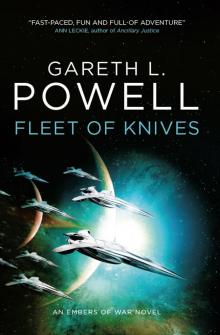 Fleet of Knives
Fleet of Knives Ragged Alice
Ragged Alice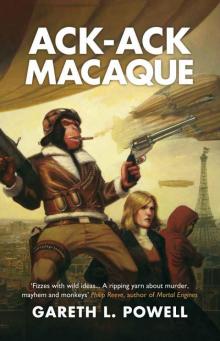 Ack-Ack Macaque
Ack-Ack Macaque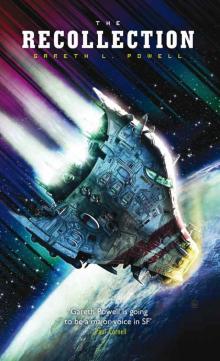 The Recollection
The Recollection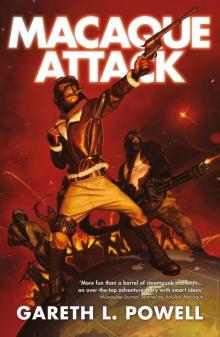 Macaque Attack!
Macaque Attack! Embers of War
Embers of War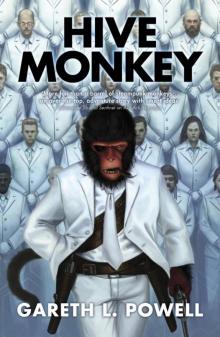 Hive Monkey
Hive Monkey